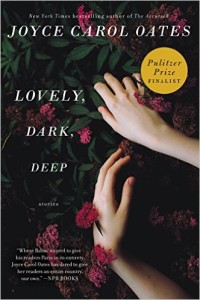
By: Lynda Schor
Joyce Carol Oates is so prolific that it’s easy to forget that some of her works are unforgettable. The last book that I read by Oates was A Widow’s Story: A Memoir, because, I’ll admit it, as a non-prolific writer I was curious about her marriage. What sort of husband could live for forty-seven years with someone whose whole life seems to be writing and teaching.
I am glad to be immersed in another book by Oates, and especially her latest collection of short fiction, Lovely, Dark, Deep. These stories are captivating, compassionate and haunting—dark and funny at the same time.
The five stories I read for the BIG READ were “Sex With Camel,” “Mastiff,” “The Hunter,” “The Disappearing,” and “The Jesters.” All of these five stories are linked by loss, yet they didn’t leave me with a sense of sadness, but rather, like the best art, I was left with wonder at their dark honesty and their myriad implications.
“Sex With Camel” is about a boy going with his grandmother to her cancer treatment at a new hospital, after she’s heard at the old one that her cancer is terminal. On the way, the boy, in a jokey way, reveals his obsession with suicide. The boy hangs around the hospital waiting for his grandmother and thinking about jokes he can tell her so they can laugh, and so he can forget about his panic attacks and her terminal illness. He sees some anorexic girls from Eating Disorders, whose closeness to death he finds alluring, and whose looks fascinate him, “Beautiful angel girls, with faces that clutched at him. Hot looking—except that they were, on second glance, too skinny—scary-skinny.” On the way home he drives the grandmother’s new Bellanova White Pearl Acura “that held the road so beautifully. A quiet engine, like a heart that doesn’t rattle.” The two of them banter, enjoying each other’s company. Unspoken is that this car that will probably be his, but only after the loss of his grandmother.
In “Mastiff,” characters called only “the woman,” and “the man,” go hiking on a difficult trail in Wild Cat Canyon, where they see a man with a huge scary mastiff on a leash. The woman, terrified by the dog, thinks, “This isn’t a dog. It’s a man on his hands and knees,” while the man, sensing the woman’s fear, praises the dog’s beauty. Neither the man nor the woman seem to like each other much, and though they’ve had sex, they’ve never slept together all night.. The woman is annoyed at the man’s distance, and how he is more focused on taking photos than talking or touching. The man is annoyed that she is not wearing proper hiking boots, and has forgotten to bring a sweater and some water.
On the trail, the woman speculates about her loneliness and her lack of ability to have an intimate relationship. “She could have wept. She would soon be forty-two years old. Yet it happened. In the new man’s company the woman felt a rare hopefulness.”
On the way back down the trail, the woman sees the mastiff, pulling its owner along. The dog breaks away and attacks the woman, snarling, biting, and nearly knocking her over. The man automatically intervenes, and the dog viciously attacks the man. Finally the dog’s owner is able to pull him away, and promises to get help, leaving the collapsed and lacerated man lying in the woman’s arms. The woman helps the man to the Ranger’s Station, and is taken to the ER at a hospital nearby. When the woman arrives at the hospital, she finds out that on the way the man has had a dangerous seizure. This catastrophe has immediately escalated their intimacy, and at the hospital the woman says she’s his fiancé. In gratitude for his intervention with the dog, she stays with the man in the hospital, takes charge of his medications, looks in his wallet to find out more about him, and promises to pick him up whenever he’s able to leave. She’s slipped into the role of loyal wife, just as the man had slipped into the role of protector. This sliding into roles seems to be both inevitable and highly dangerous in Oates’ fiction.
“The Disappearing,” is about a wife’s fears that her husband’s gradual divestment of his belongings and clothing means he’s preparing to leave her—or even perhaps has another family somewhere. “If marriage is a masquerade,” she thinks, “there is a very real danger that the mask may slip.” The wife becomes more and more unhinged and begins to follow him, imagining all sorts of betrayals. The more she obsesses the less she finds out, until the only thing that’s clear is that she’s one of the things in his life that have disappeared.
In “The Jesters,” a comfortably off, retired couple, become fascinated by, jealous of, eventually annoyed by, and then horrified by the lives of their mysterious neighbors, whose house they can’t see but which is apparently identical to their own house in that same gated community. The more they listen for signs of their neighbors’ lives, (sex, parties, babies, children) the more they realize their marriage has become sterile, their lives empty. “In a marriage, the most intense conversations are with oneself,” says the wife. When the couple finally go to look for the house the sounds have been coming from—well, I’ll just say that the results are surrealistic and spooky—and completely satisfying.
In “The Hunter,” one of my favorites, an accomplished female poet is invited by the president of a college to be poet in residence for two weeks, a prestigious gig, but one where she’s still required to do a lot of teaching. The president, Rob Flint, confident, self-important, and is a hunter too. He seems to think that the poet’s appointment as the Caldwalder Poet In Residence for two weeks includes her being available to him. The poet becomes Rob Flint’s lover though she doesn’t seem to like him, or their sex. Still, she fantasizes that he will divorce his wife for her. “The Hunter” is a complex story that defies a short summary. After I’d read all five stories for The Big Read, I wanted to read all the others. I have a feeling you will too.
